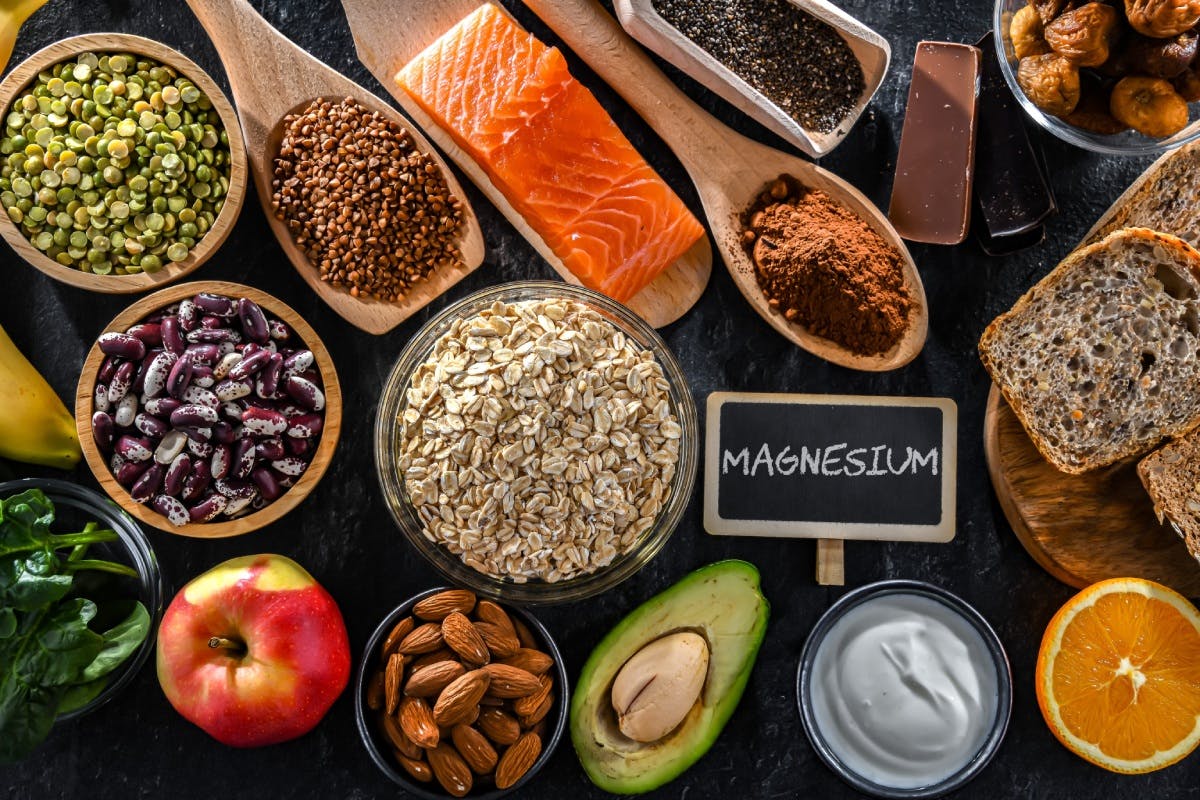Manganese vs. Magnesium: What’s the Difference?

If you’re not a nutritionist or a scientist, it may be easy to confuse magnesium with manganese. They do have similar spellings, after all! Learn the difference between these two essential minerals1 and what they do for your body.
What is Manganese?
Manganese is a trace mineral that plays a role in a number of chemical processes within the body.1,3 While you don’t need much of it—adult men and women need 2.3mg daily and 1.8mg a day respectively—it’s vital for staying healthy.2
Some of the processes in your body that require manganese include:1,2,3
- Breaking down carbohydrates, proteins and cholesterol
- Blood clotting
- Helping the immune and reproductive systems to function properly
- Building bones
Since manganese cannot be produced by the body, it must be consumed in the foods we eat.3 Good sources of this mineral include:1,2,3
- Whole grains like brown rice
- Legumes such as soybeans and lentils
- Leafy greens like spinach and kale
- Many common spices, like black pepper
What Is Magnesium?
Magnesium is considered a micronutrient and is essential for hundreds of different bodily processes and chemical reactions.1,5
What Does Magnesium Do For The Body?
Your body needs magnesium to function properly. This mineral helps to regulate muscle and nerve function.4 It also assists with regulating blood sugar levels and blood pressure and is crucial for making bone, protein and DNA.1,4 It acts as an electrical conductor that facilitates muscle contractions and a steady heartbeat.1,5
Benefits of Magnesium
Studies are ongoing to understand exactly how magnesium works and how it can affect different aspects of our health since it plays such a key role in so many bodily functions.4,5 When adults receive the recommended amount of magnesium (400-420mg a day for men and 310-320mg a day for women)4, they reap a number of health benefits:
1. Bone Health
Magnesium is a major component of our bones.5 50-60% of the body’s magnesium is stored there, with the rest in soft tissue and blood.5 People with higher intakes of this mineral have a higher bone mineral density, which can help reduce the risk of osteoporosis and fractures.4 Magnesium is frequently included in supplements for bone health because it helps the body convert vitamin D into its active form and assists the enzymes that break it down for use.5 Some research has indicated that high intakes of magnesium correlate with a reduced risk of vitamin D.5 However, more research is needed to see if supplementation can actively prevent osteoporosis.
2. Nerve Function
Magnesium plays a key role in how our brains work by interacting with a specific receptor in the brain.6 It serves as a blockade for calcium in this receptor; this blocking inhibits certain brain signals that are frequently implicated in various brain disorders.6 It may be implied that individuals who maintain recommended amounts of magnesium in their diets are prolonging normal brain and nerve function, as lower levels may lead to an environment conducive to excessive cell excitation and eventual cellular death.6 Studies on nerve function and magnesium have indicated that the mineral may have an effect on migraines and chronic pain, though research is ongoing.6
3. Blood Sugar Regulation
Magnesium helps to regulate blood sugar and insulin activity, and people with higher amounts of this mineral in their diets often have a lower risk of developing type 2 diabetes.4,5 It helps the body to break down sugars and may impact insulin resistance, which is a condition that leads to diabetes.4
4. Heart Health
This mineral helps to regulate the rhythm of your heartbeat, which has a direct impact on your blood pressure.4 While magnesium supplementation may fractionally decrease high blood pressure, some studies have shown that people who consume diets that are low in magnesium may have an increased risk for heart disease.4,5
Sources of Magnesium
An estimated 50% of the US population isn’t consuming enough magnesium despite its wide availability in foods.6 Older men and teenagers of either gender are the most likely to not get enough of this essential mineral.4
Thankfully, magnesium is naturally found in many healthy foods, such as:1,4,5
- Dark leafy greens like Swiss chard and spinach
- Legumes such as black beans and soybeans
- Nuts and seeds including almonds and pumpkin seeds
- Whole grains like brown rice and oatmeal
- Dairy and dairy alternatives like soy milk and yogurt
Magnesium is also available as a supplement but can have a laxative effect at high doses.6 Speak with your healthcare provider before taking a magnesium supplement, it can interact or interfere with some medications.4
Support your immune system* on the go with Emergen-C Immune+ Super Orange with Triple Action fizzy drink mix. Each serving contains 1000 mg of Vitamin C, as well as zinc, magnesium, manganese and Vitamin D to support your immune system.*
*This statement has not been evaluated by the Food and Drug Administration. This product is not intended to diagnose, treat, cure, or prevent any disease.
Source Citations:
1. Manganese vs. Magnesium: Two Important Minerals With Key Differences. Cleveland Clinic. https://health.clevelandclinic.org/manganese-vs-magnesium. Accessed 3/10/25.
2. Manganese. National Institutes of Health. https://ods.od.nih.gov/factsheets/Manganese-Consumer/. Accessed 3/10/25.
3. Manganese. Harvard School of Public Health. https://nutritionsource.hsph.harvard.edu/manganese/. Accessed 3/10/25.
4. Magnesium. National Institutes of Health. https://ods.od.nih.gov/factsheets/Magnesium-Consumer/. Accessed 3/10/25.
5. Magnesium. Harvard School of Public Health. https://nutritionsource.hsph.harvard.edu/magnesium/. Accessed 3/10/25.
6. The Role of Magnesium in Neurological Disorders. National Library of Medicine. https://pmc.ncbi.nlm.nih.gov/articles/PMC6024559/. Accessed 3/10/25.








































